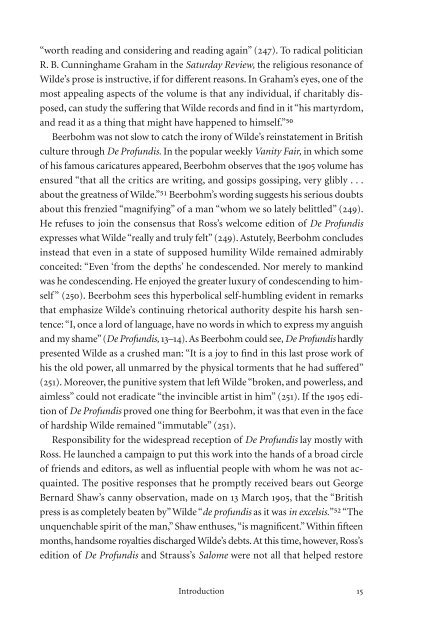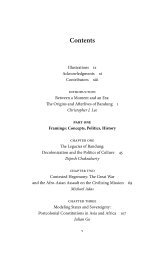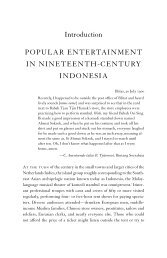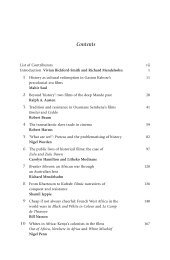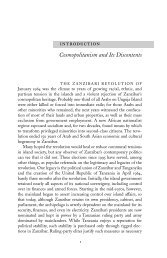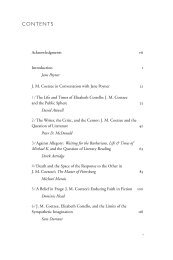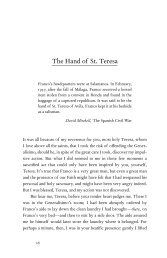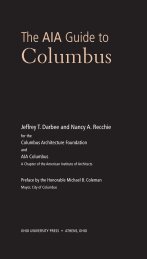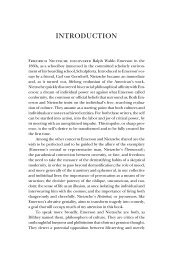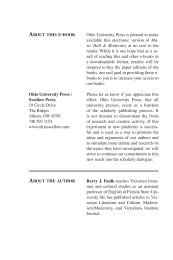Oscar Wilde and Modern Culture - Ohio University Press & Swallow ...
Oscar Wilde and Modern Culture - Ohio University Press & Swallow ...
Oscar Wilde and Modern Culture - Ohio University Press & Swallow ...
Create successful ePaper yourself
Turn your PDF publications into a flip-book with our unique Google optimized e-Paper software.
“worth reading <strong>and</strong> considering <strong>and</strong> reading again” (247). To radical politician<br />
R. B. Cunninghame Graham in the Saturday Review, the religious resonance of<br />
<strong>Wilde</strong>’s prose is instructive, if for different reasons. In Graham’s eyes, one of the<br />
most appealing aspects of the volume is that any individual, if charitably disposed,<br />
can study the suffering that <strong>Wilde</strong> records <strong>and</strong> find in it “his martyrdom,<br />
<strong>and</strong> read it as a thing that might have happened to himself.”₅⁰<br />
Beerbohm was not slow to catch the irony of <strong>Wilde</strong>’s reinstatement in British<br />
culture through De Profundis. In the popular weekly Vanity Fair, in which some<br />
of his famous caricatures appeared, Beerbohm observes that the 1905 volume has<br />
ensured “that all the critics are writing, <strong>and</strong> gossips gossiping, very glibly . . .<br />
about the greatness of <strong>Wilde</strong>.”₅₁ Beerbohm’s wording suggests his serious doubts<br />
about this frenzied “magnifying” of a man “whom we so lately belittled” (249).<br />
He refuses to join the consensus that Ross’s welcome edition of De Profundis<br />
expresses what <strong>Wilde</strong> “really <strong>and</strong> truly felt” (249). Astutely, Beerbohm concludes<br />
instead that even in a state of supposed humility <strong>Wilde</strong> remained admirably<br />
conceited: “Even ‘from the depths’ he condescended. Nor merely to mankind<br />
was he condescending. He enjoyed the greater luxury of condescending to himself”<br />
(250). Beerbohm sees this hyperbolical self-humbling evident in remarks<br />
that emphasize <strong>Wilde</strong>’s continuing rhetorical authority despite his harsh sentence:<br />
“I, once a lord of language, have no words in which to express my anguish<br />
<strong>and</strong> my shame” (De Profundis, 13–14). As Beerbohm could see, De Profundis hardly<br />
presented <strong>Wilde</strong> as a crushed man: “It is a joy to find in this last prose work of<br />
his the old power, all unmarred by the physical torments that he had suffered”<br />
(251). Moreover, the punitive system that left <strong>Wilde</strong> “broken, <strong>and</strong> powerless, <strong>and</strong><br />
aimless” could not eradicate “the invincible artist in him” (251). If the 1905 edition<br />
of De Profundis proved one thing for Beerbohm, it was that even in the face<br />
of hardship <strong>Wilde</strong> remained “immutable” (251).<br />
Responsibility for the widespread reception of De Profundis lay mostly with<br />
Ross. He launched a campaign to put this work into the h<strong>and</strong>s of a broad circle<br />
of friends <strong>and</strong> editors, as well as influential people with whom he was not acquainted.<br />
The positive responses that he promptly received bears out George<br />
Bernard Shaw’s canny observation, made on 13 March 1905, that the “British<br />
press is as completely beaten by” <strong>Wilde</strong> “de profundis as it was in excelsis.”₅² “The<br />
unquenchable spirit of the man,” Shaw enthuses, “is magnificent.” Within fifteen<br />
months, h<strong>and</strong>some royalties discharged <strong>Wilde</strong>’s debts. At this time, however, Ross’s<br />
edition of De Profundis <strong>and</strong> Strauss’s Salome were not all that helped restore<br />
Introduction 15


